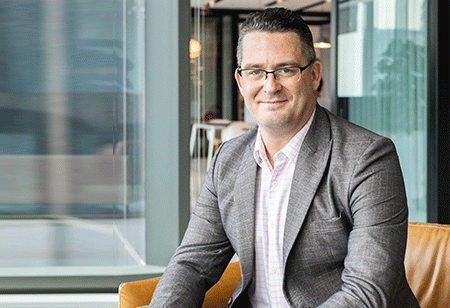
In conversation with Prisila,Correspondent, Asia Business Outlook Magazine.Daren shares his views on the role does technology play in enabling successful workcations and supporting the work-from-anywhere trend and potential drawbacks to excessive reliance on technology in this context.
Darren Rogers, brings with him over a decade of experience in the flexible workspace and commercial real estate sectors, and across a range of functions in sales, marketing, operations and business development. Challenges faced by employees working from different locations around the world
Our research shows a growing popularity of workers in the region and around the world enjoying the greater flexibility that hybrid working brings. Such flexibility has now become a baseline expectation for many employees and job seekers, especially post-pandemic. In today's evolving work landscape where there is fierce competition for talent across many industries, flexibility can be a huge benefit for employers, especially those who wish to attract and retain top talent. According to our research, almost 1 in 2 employees will quit their job if asked to return to the office 5 days a week.
With that said, the rise of digital technologies has made flexible working arrangements more achievable, allowing employees to work from wherever that’s most convenient. This is why we’re also seeing an increasing trend of workcations and digital nomads. Such remote workers value work-life balance, and that includes having access to conducive working environments with reliable internet connection, while also being able to spend more time on hobbies and loved ones.
On our part, we make sure that such digital nomads are well supported in their working arrangements; they deserve access to high-quality professional workspaces, business centres and co-working desks with dependable connectivity – and we make these accessible to them on a global scale. With approximately 4,000 locations in 120 countries, we are able to help facilitate and provide for these remote workers’ many disparate work requirements, both digitally and in-person. They get to connect with their colleagues on the other side of the world while being in the company of other like-minded individuals in a safe, shared space.
Role does technology play in enabling successful workcations and supporting the work-from-anywhere trend and potential drawbacks to excessive reliance on technology in this context
Access to modern, quality technology is key to a successful workcation, whether that means Wi-Fi connectivity, a fully-equipped desktop, remote conferencing capabilities or even a dedicated IT support staff. Technology is able to facilitate, support and even enhance one’s working arrangements. Ideally, a fully integrated work-from-anywhere experience should enable remote workers and digital nomads to perform just as they would in their typical work setting, if not better, while also allowing them to fully immerse in the location’s culture and people. Companies are increasingly leaning on technology to work more efficiently, especially with all signs pointing towards workcations and hybrid working being here to stay. In fact, our studies show that nearly 70% of employees in the region favour a hybrid approach, preferring to split their time across multiple locations –and technology helps make that possible.
The rise of digital technologies has made flexible working arrangements more achievable, allowing employees to work from wherever that’s most convenient.
Challenges might hybrid workers face in terms of maintaining work-life balance
When it comes to workcations and hybrid working, employees may wish to have clear boundaries between their professional and personal lives. Such boundaries were somewhat blurred during the pandemic since work from home was the default for many, but now employees are finding that it is possible to have a better balance, and having access to flex and hybrid spaces makes this possible. Our current study found that improved work-life balance (76%) is the most common benefit cited for working from anywhere.
This is supported by external research and surveys that overwhelmingly suggest that remote and hybrid work options enhance work-life balance and overall employee well-being. Studies show increased job satisfaction, reduced stress, and greater happiness among remote workers compared to their in-office counterparts. Ultimately, while challenges may exist for some, remote and flexible working arrangements continue to offer substantial benefits for employee health and work-life harmony.
"To effectively navigate the shift towards work from anywhere, a key consideration is relooking productivity metrics that prioritises an individual’s work output over presenteeism."
As more people explore working from anywhere, what are some considerations that employees and employers should be mindful of? People are now seeing work from anywhere as a win-win for both companies and their employees. Businesses are getting the best talent – 84% of Singaporeans prefer hybrid working, which is the highest in APAC – and a more productive workforce. Meanwhile, employees are benefitting from an improved work-life balance.
To effectively navigate the shift towards work from anywhere, a key consideration is relooking productivity metrics that prioritises an individual’s work output over presenteeism. This approach helps to foster trust and autonomy among employees. It is also important to consider establishing clear communication principles like what technology to use for meetings and asynchronous work and how to ensure that communication is inclusive of everyone. But perhaps the biggest consideration is the importance of bringing people together on a relatively regular basis to collaborate and socialize, and the frequency of this will differ depending on the industry.
And we are committed to making this transition smoother for businesses of all sizes and their employees, no matter where they are in the world. In addition to our extensive global network of well-equipped flexible workspaces, we are eyeing to launch 1,000 more new locations in the next year.
We use cookies to ensure you get the best experience on our website. Read more...